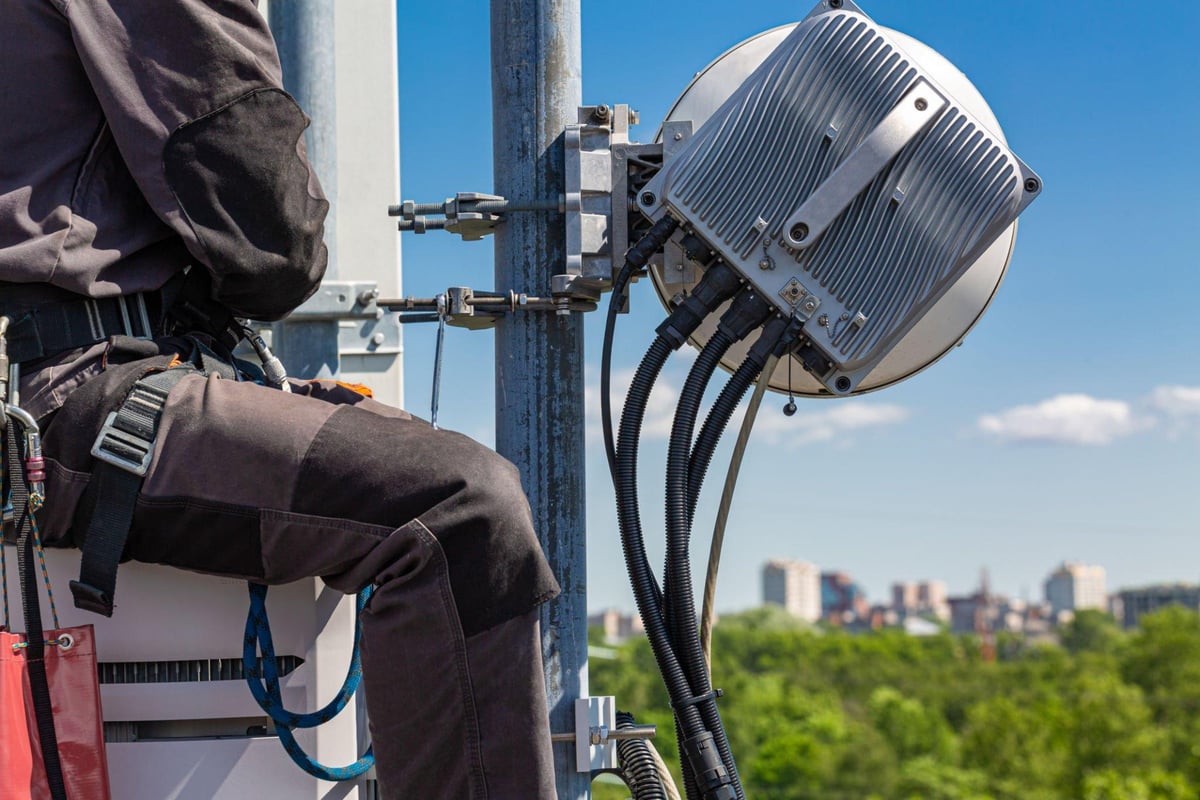
No cost info

Financial aid (may be available)

Financial aid (may be available)

No cost info
When it comes to the telecommunications industry, tower technicians, or tower climbers as they are sometimes referred to, are the unsung heroes. They play a vital role in ensuring that our phones, radios, and televisions work seamlessly. This blog post will guide you to becoming a Dallas/Fort Worth tower technician. We will walk you through the training requirements, what to look for in a class, what to expect from the day-to-day class and the certification process.

A tower technician is a professional responsible for installing, maintaining, and repairing cell towers. They ensure that the crucial infrastructure for wireless communications is in optimal condition. Climbing high towers, diagnosing and fixing technical issues, and performing regular maintenance checks are part of a tower technician's job description.
Becoming a tower technician requires specific training and skills. Here are a few things to keep in mind:
No formal education is required to be a tower technician. However, most employers prefer candidates with a high school diploma or equivalent.
Basic knowledge of telecommunication systems is necessary. Many vocational training programs offer courses that cover these areas.
Physical fitness is a must. Tower technicians often work at great heights and in various weather conditions.
Safety training is crucial. This includes learning about fall protection, rescue techniques, and first aid.
Before you enroll in a tower technician class, it's important to consider the following:
Accreditation: Make sure a recognized institution accredits the program you will take. This guarantees that the program meets industry standards.
Curriculum: The curriculum should cover all aspects of tower technician work, including safety procedures, equipment handling, and telecommunications systems.
Hands-On Training: Practical, hands-on training is vital for tower technicians. The class should offer opportunities for you to practice and hone your skills.
Instructors Experience: The instructors should have substantial experience in the field. They should be able to offer real-world insights and advice.
You can expect a blend of classroom lessons and practical sessions in a typical tower technician class.
Classroom Sessions: These sessions will cover theoretical aspects of the job, including understanding telecommunications systems, learning about various equipment, and studying safety protocols.
Practical Sessions: These hands-on sessions allow students to gain practical experience. They might involve climbing practice, equipment handling, and mock maintenance tasks.
The certification process for tower technicians varies. After completing a training program, you may need to pass a certification exam. Some training programs might include certification as part of the course. You'll likely need to complete continuing education courses periodically to maintain your certification.
After becoming a certified tower technician, you can find job opportunities in various sectors. This includes telecommunications companies, tower installation firms, and maintenance service providers. You can leverage job search platforms or tap into networking opportunities to find jobs in your area.
Once you've become a tower technician, you might want to consider additional training to enhance your skills. Here are a few options:
Advanced Safety Training: This can help you stay updated on the latest safety protocols and techniques.
Specialized Equipment Training: This can help you gain expertise in handling specific tools or equipment commonly used in your work.
Management Training: If you're aiming for a supervisory or managerial role, management training can be beneficial.
Texas, the second-largest state in the U.S., has a vast telecommunications network. This creates ample opportunities for tower technicians.
Job Opportunities: With numerous telecommunications companies based in Texas, job opportunities are plentiful for tower technicians.
Career Advancement: Texas provides an excellent platform for career advancement. As you gain experience and additional training, you can move up the ladder to supervisory or managerial roles.
Texas' telecommunications industry is among the largest in the U.S. This means that the demand for skilled tower technicians is high, making it an excellent place to start your career.
Becoming a tower technician can be a rewarding career choice. With the right training and a commitment to safety, you can enjoy a fulfilling career in a thriving industry. Whether you're just starting or looking to advance your career, Texas offers numerous opportunities for tower technicians.
For more information about careers in Texas, check out these informative articles on how to become a truck driver in Texas, how to become an HVAC technician in Texas, and how to become a sterile processing technician in Texas.
If you're exploring options in this field in various locations, Dreambound's extensive guides are a great resource. We've got detailed insights for numerous cities. check out some additional guides below:
Thinking about a potential career transition? Dreambound offers detailed guides to help you with making an informed decision. Dive in below:
Dreambound's platform allows prospective students to find the right educational program for them through searching, filtering, and connecting with our extensive selection of career & technical education partners.
Dreambound has over 70 programs across healthcare, technology, business, and industrial trades. This includes programs such as Medical Billing, Cybersecurity, and welding.
Some of our schools offer financial aid for those who qualify. Many others offer payment plans, where you can pay the cost of class over time.
Yes, Dreambound offers many online programs. On Dreambound's search, you can filter by online, in-person, and hybrid (part online, part in-person).
Dreambound is completely free for you to use! We are supported by schools and organizations who pay to advertise on our website, so we can offer all of our career resources for free.